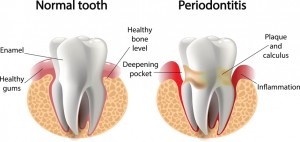“Peri” means around and “odontal” means referring to the tooth. Periodontal disease refers to an infection of the structures surrounding your teeth. These include gums, the cementum that covers the root, the periodontal ligament, and the alveolar bone. In the early stages of periodontal disease, the gums are affected first. They may become puffy, sore, and bleed when brushing teeth. In more severe forms of periodontal disease, all other surrounding structures become infected as well. It is very important to understand the causes of periodontal disease, the early signs and symptoms, and how to prevent the disease from occurring in the first place.
Causes of Periodontal Disease
Periodontal disease is caused by bacteria in dental plaque. Plaque is the sticky substance you try to get rid of when brushing your teeth. It is bacteria that forms around your tooth if you do not brush often. In an effort to fight the bacteria surrounding your teeth, you body releases substances that inflame and irritate the gums. This is what leads to the swollen, bleeding gums. If you don’t care about your oral hygiene, plaque will build up exponentially. Eventually, it will spread below the gum line. Your toothbrush won’t be able to reach the bacteria beneath the gumline, and your gums will start to swell. Once they start swelling, gums will detach from the tooth. Pockets will form between the tooth and gum, and bacteria will grow rapidly within them. This huge build up of plaque may destroy the periodontal ligament and alveolar bone.
Early Signs and Symptoms of Periodontal Disease
- Gingivitis– The swelling, irritation, and bleeding of gums when you brush them. This is not a normal sign of healthy teeth and should be taken as a warning sign
- Bad Breath and Taste– Gums will begin to recede from the tooth, creating pockets of bacteria. These pockets cause bad breath and taste.
- Abscess Formation– a collection of pus pockets that are painful, swollen and release discharge from the gum tissues. This is an advanced symptom of the disease, and bone loss may likely be occurring.
How to Prevent Periodontal Disease
Periodontal disease can be prevented if you take care of your teeth. You should schedule a cleaning with your dentist every six months to keep bacteria from receding beneath the gumline. Smoking and tobacco use contribute extensively to periodontal disease. Quit smoking, or don’t start if you care about your dental health. Braces, crowned teeth, or bridgework can make cleaning teeth a task. Use floss to slide in and around these barriers so plaque doesn’t build up. Poor nutrition and poor dental hygiene will cause periodontal disease, so always make sure you are eating a balanced breakfast, lunch, and dinner and are adequately brushing teeth after each meal.
When Should I Call My Dentist?
Catonsville Dental Care provides high-quality dental services to Catonsville, MD and the surrounding areas. If you’re concerned about your gum health, or any other dental issues, we will be happy to provide you with the service and care that all of our patients have come to expect. We offer teeth whitening, implants, Invisalign, and other dental services as well as routine dental care and corrective treatments. With years of experience and countless testimonials, we’re your one-stop offices for all of your dental needs!
Book your appointment through our website today, or gives us a call today at410-747-1115 for your FREE consultation! You can also view the rest of our services and current specials HERE.

